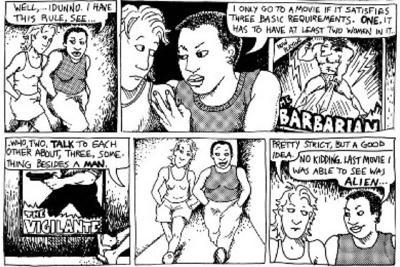Molly Jackson: Pass or Fail?
 I went to see Star Wars: The Force Awakens on opening night. That’s not incredibly impressive because so did almost everyone else. While I was on line for my overpriced movie snacks, I did overhear a very interesting conversation. Three guys in their late twenties, talking about the Bechdel test and if certain movies would pass or fail.
I went to see Star Wars: The Force Awakens on opening night. That’s not incredibly impressive because so did almost everyone else. While I was on line for my overpriced movie snacks, I did overhear a very interesting conversation. Three guys in their late twenties, talking about the Bechdel test and if certain movies would pass or fail.
In case you don’t know what the Bechdel test is, here are some details. The Bechdel test (also known as the Bechdel-Wallace test) first appeared in Alison Bechdel’s comic strip Dykes To Watch Out For. In a strip published in 1985 “The Rule”, two women discuss seeing a film and one of them lays out these rules that we have all come to use. The rules are: 1) The movie has to have at least two women in it, 2) who talk to each other, 3) about something besides a man. After the comic strip’s publication, it has also become common to require that both women have character names.
 It has been applied to TV shows on a regular basis. I’m fairly certain that every episode of Buffy hasn’t passed this test. Teenage girls do spend a lot of time whining about their undead boyfriends in between saving the world from the bad guy. And my favorite comic book, The Life and Times of Savior 28, definitely doesn’t pass. (You should still read it though.) These examples don’t diminish the fact that this test, while far from perfect, is our only real judge of women in movies or any form of media.
It has been applied to TV shows on a regular basis. I’m fairly certain that every episode of Buffy hasn’t passed this test. Teenage girls do spend a lot of time whining about their undead boyfriends in between saving the world from the bad guy. And my favorite comic book, The Life and Times of Savior 28, definitely doesn’t pass. (You should still read it though.) These examples don’t diminish the fact that this test, while far from perfect, is our only real judge of women in movies or any form of media.
So back to my eavesdropping. Here are three fairly young good looking albeit kinda hipster guys chatting about the Bechdel test and how movies need to change to better represent women. They were talking about the movie The Big Short in the context that women weren’t as involved with the real life events (which I don’t know is true) so that is why it probably won’t pass. They actually got really serious and intense in talking about the gender inequality in movies, especially in relation to the Bechdel test.
So, in overhearing all of this, I started to giggle. One of them caught my eye and we began to chat. I told them that the test had worked perfectly in their case because it made their discussion happen. When this comic was published, this conversation wasn’t happening on a movie concession line or probably anywhere else. When it finally started, it was women forcing the conversation upon men, as they explored the possibilities for equality in movies. Now, men are becoming equal partners in wanting to see change happen.
I’m not saying this change is going to be immediate; in fact it has been going on for longer than anyone’s lifetime who is reading this. Nevertheless, compared to 30 years ago when this was published, the conversation is happening on a public level. Yes, there are still people who deny the conversation exists, and we all know that equality is a hot button issue right now.
The world isn’t perfect and there is still a lot of room to grow. Sometimes the way things are really gets me down. But sometimes, I overhear the very best things and get re-inspired that we can change for the better.












